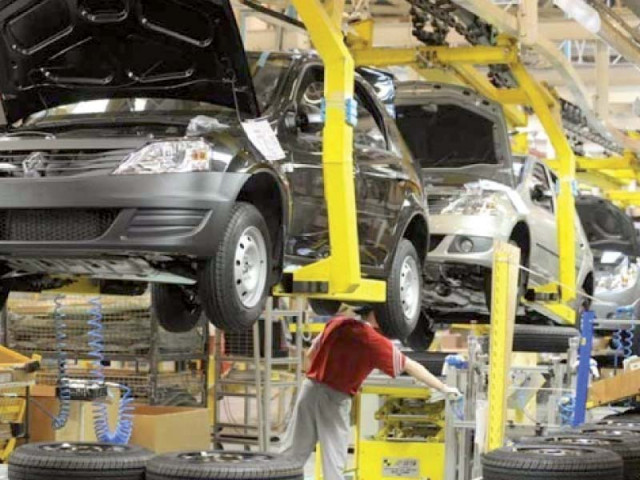Experts seek auto sector revamp
Propose formulation of 10-year policy, tax reduction, encouragement of SMEs

Analysts and pundits of the automotive industry have urged policymakers to bring about a paradigm shift quickly with a view to revamping the industry in this testing time.
They presented a host of proposals to bolster the industry through formulating a 10-year consistent policy, activating Pakistan Standards and Quality Control Authority (PSQA), reducing taxes as almost 40% price of vehicles consists of taxes and encouraging small and medium-sized enterprises (SMEs) to make exports.
The Express Tribune approached industry mentors to get their views on enhancing exports, localising the industry and strengthening the national economy.
Pakistan Association of Automotive Parts and Accessories Manufacturers (Paapam) Chairman Abdul Rehman Aizaz said allowing imports of raw material at zero duty and doing away with regulatory duties on all raw materials would ensure the availability of all necessary raw materials at regionally competitive prices, similar to India, China and Turkey.
He said policymakers must rationalise energy costs, minimise and rationalise the high rate of financing, formulate a 10-year policy to increase the capacity and exports of auto parts, provide export rebate and enhance the participation of Pakistani auto parts industry in international exhibitions to promote local parts globally.
“If we want to discourage imports, we should take a bunch of steps – stop smuggling and massive under-invoicing, activate PSQCA for curbing substandard production and selling of parts and reduce sales tax to 5% for five years,” he added.
Aizaz said consistent policies and incentives to original equipment manufacturers (OEMs) for meaningful localisation could promote the local automobile industry.
He said owing to mostly macroeconomic issues, the country lagged behind in all industries in comparison with neighbouring countries. The industry was saddled with taxes and was paying the share of agriculture and retail sectors, he said, adding that almost 40% price of automobile consisted of taxes, resulting in low volumes and keeping vehicles out of the reach of common people.
He said the automobile industry was capital intensive and needed volumes to sustain as Pakistan’s ratio of car usage per capita was the lowest in the region.
He added that low quality engineering education and a large number of PhDs at government expenses contributed almost nothing to industries.
Author and auto maven Murtaza Mandviwala asked for formulating an automotive export strategy with stakeholders as there was an auto export policy but no strategy. “Export focus should be on automotive parts and not passenger cars in a finished form because exporting cars is not feasible with the import duty structure of raw materials and components.”
He said Pakistani automotive engineering and many other engineering industries depended on importing raw material and components.
Read: Seres impressive EV lineup: Bringing cutting-edge technology to the Pakistani auto industry
“You cannot sustain engineering industries, if you restrict their raw material and components’ import. Ban used car imports. By allowing used car imports, as an easy means of collecting customs duty, the regulators are promoting money laundering,” he said.
“The auto industry is the mother of all engineering industries. India and China are large and developed economies with a strong engineering base and locally produced raw material.
“On top of that, a passenger car is made up of 12,000-20,000 components and 25,000 inputs. No country in the world has a totally indigenous passenger car. We are amongst the 40 countries of the world which has an automotive industry,” he said.
He added that Pakistan was left with road transport as the only form of mobility because of poor railroads, no waterways and a few airports. He quoted his own book “Steering the Pakistani Wheel” which provided insights into the way forward for the regulators.
Analyst and researcher Dr Aadil Nakhoda said taking initiatives to jack up exports aimed to encourage a role of SMEs in exports, remove bureaucratic hurdles in trade, digitalise trade procedures and processes by better incorporation of Pakistan Single Window (PSW), scale down all import tariffs to eliminate anti-export bias and ensure currency movement according to expectations so that businesses could undertake international trading activities with reduced risks.
“First, imports themselves are not necessarily bad. Imports at times of crisis do increase balance of payments crisis. This is unfortunately due to the lack of productivity in Pakistan that fails to convert imports into exports through greater value addition. We should improve linkages between imports and exports,” he said.
He added that the industry would be promoted once they provided better quality outputs at a competitive price. He said the local industry required competition as that would improve the quality of output and increase their desire to innovate.
He said there was a lack of innovation and inward-looking focus from policymakers. Firms have little desire to churn out products and improve quality because they are inward-looking. He said the trade in auto parts and accessories was not problematic, if local producers could develop certain expertise as well as brands that could dominate in terms of regional or global market share.
Published in The Express Tribune, November 19th, 2023.
Like Business on Facebook, follow @TribuneBiz on Twitter to stay informed and join in the conversation.



















COMMENTS
Comments are moderated and generally will be posted if they are on-topic and not abusive.
For more information, please see our Comments FAQ